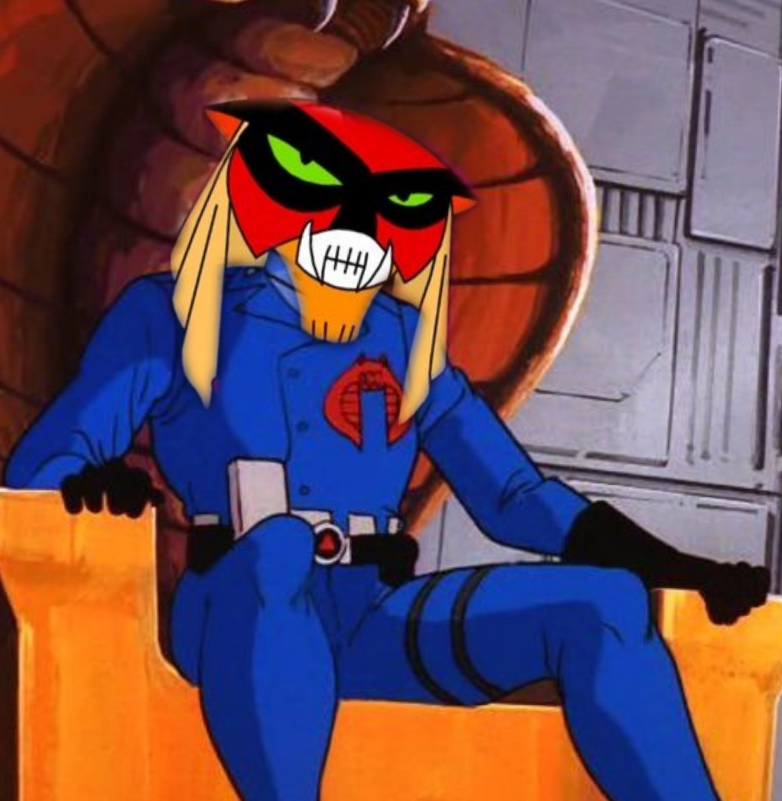Hey folks! Cobrak here, with something I think is very special.
I recently got the chance to talk with Rick Overton, friend and improv partner to the late, great Robin Williams. The subject was Robin's Wish, a documentary about the life and death of Robin Williams and the struggle he went though in the last years of his too short life.
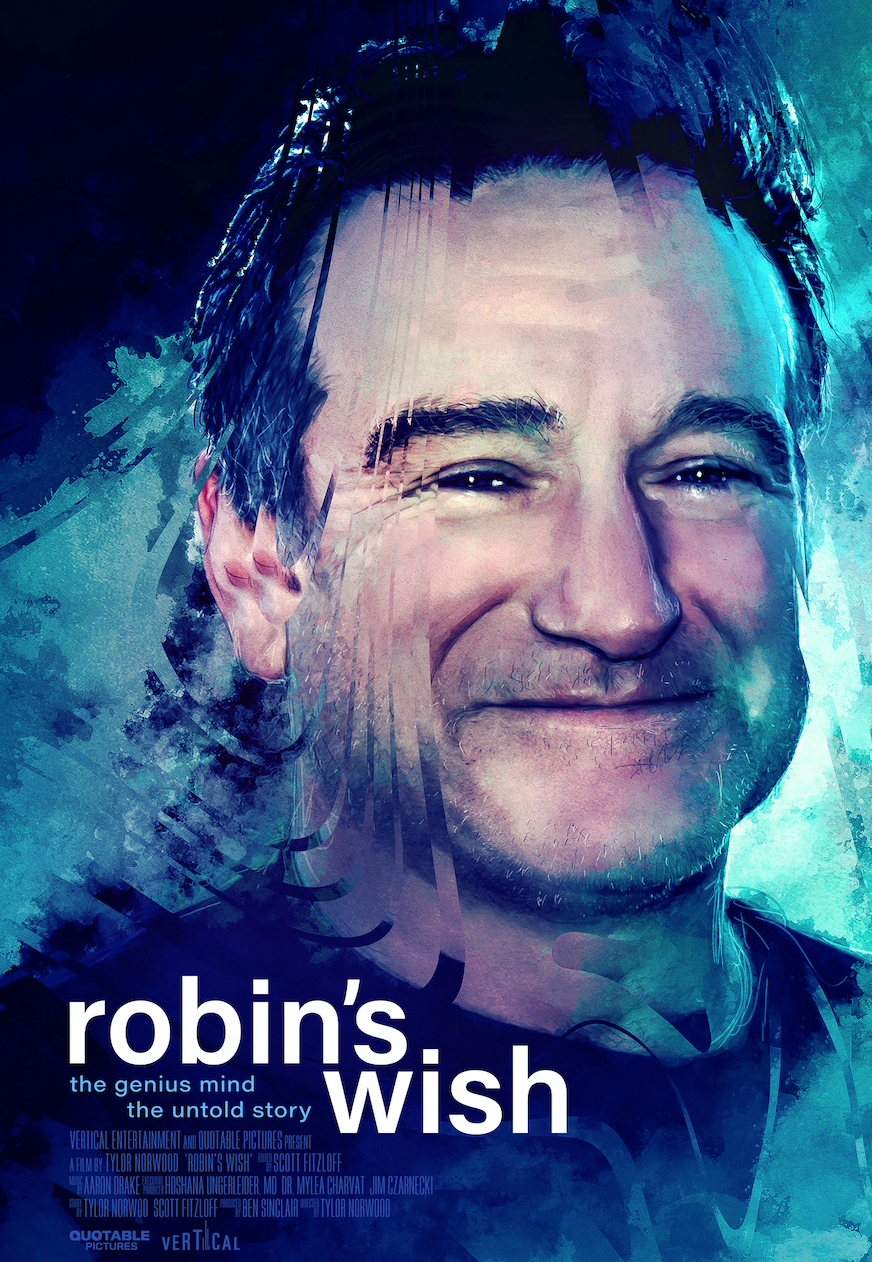
When Robin died of suicide in 2014 media speculation was rampant. Stories of his battle with depression and his past drug use were everywhere. For awhile you couldn't read the news, or even scroll through social media without seeing stories about depression and how it affects, and sadly sometimes takes, lives.
It's a very important subject to shine a light on, as depression takes it's toll on a countless number of people. Mental health has long been surrounded by a stigma, and because of that, we as a society aren't very comfortable discussing it. It's getting better, the conversations are starting to happen, but we are still a long way from being where we need to be on the subject.
What is not as discussed, and what this documentary is attempting to shine a light on, is a different type of mental illness. It's the one that actually took Robin's life. It's called Lewy Body dementia. It's the second most common type of progressive dementia.
Robin's Wish tells the story of Robin and his wife's struggle to find answers, and a proper diagnosis to a problem he knew he had, but didn't have a name for.
Here's our conversation. Hope you enjoy.
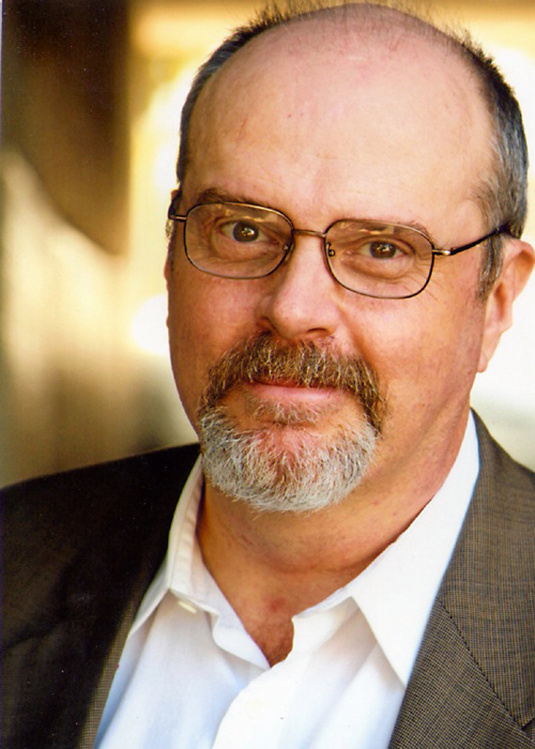
Cobrak: Hi Rick! How are you doing?
Rick Overton: Pretty good. How are you today?
C.: I'm doing well. Thanks for taking some time out to talk with me about Robin's Wish. I want you to know I watched the film recently and I thought it was an excellent, and very moving documentary. One thing I liked about watching you guys together is you both are funny, but you both also have this deep, almost philosophical, aura about you. And you can tell you two were great friends. Can you tell me a little about that friendship? How you initially hit it off? Were there ways that you felt like the two of you inspired each other?
R.O.: You absolutely nailed it. We started out trading stories back and forth, you know, about the world and how we saw it, and it turned out that a lot of that was in alignment too.
We saw the world the same; our politics were the same. We saw the same sort of wizard behind the curtain, in all the same spots. We very much thought alike.
You know, I'm so sad that Lewy body dementia, the most unfair cut of all, goes to the most fair person.
C.: Yeah.
R.O.: It is funny how life works out. 'Cause if anyone didn't deserve it, you know...
C.: I know. I can't imagine being you and talking about it. It's what took my grandpa also. That's one reason I was interested in this film.
R.O.: No! Really? You lost your grandpa to this? I'm so sorry.
C.: Thank you. It takes their personality, as you know, and that's the worst part.
R.O.: Yeah. I'd thrown arm around you if I could. I feel your pain, brother.
C.: I really appreciate it. I know you do
You talked about your political views.
How do you think he'd feel about what's going on right now in the world? The divisiveness, that's going on?
R.O.: I'm sure he would be speaking out about the madness. And the violence, and the hostility. And the irony. And duplicity of the two party system.
But he got a lot of message out in his day, you know. It takes sort of the same skills of an improvisationalist to be able to roll with this stuff too. I think if you're brittle now you're gonna break. You got to be loose and fluid.
C.: Yes. When I was a kid he was Mork and Miss Doubtfire to me. But when I got older I realized he had really strong views that I really aligned with.
R.O.: Yeah. Farm Aid, did you see him in Farm Aid and how he spoke out? And when he was talking about the homeless too on HBO (Comic Relief)? He was really very outspoken about injustice. He didn't really pick a side. He didn't take sides. He saw injustice where it was and called it. He was very brave about it
C.: Yeah. And that goes back to that fearlessness. A lot of people see these things, but they either pick a side or they ignore it. He didn't seem to do that.
R.O.: I've fought for what I thought was the right thing to say, to the cost of my stand up career to some degree. But you know when I see Robin do it, it would give me the strength to keep fighting and do it.
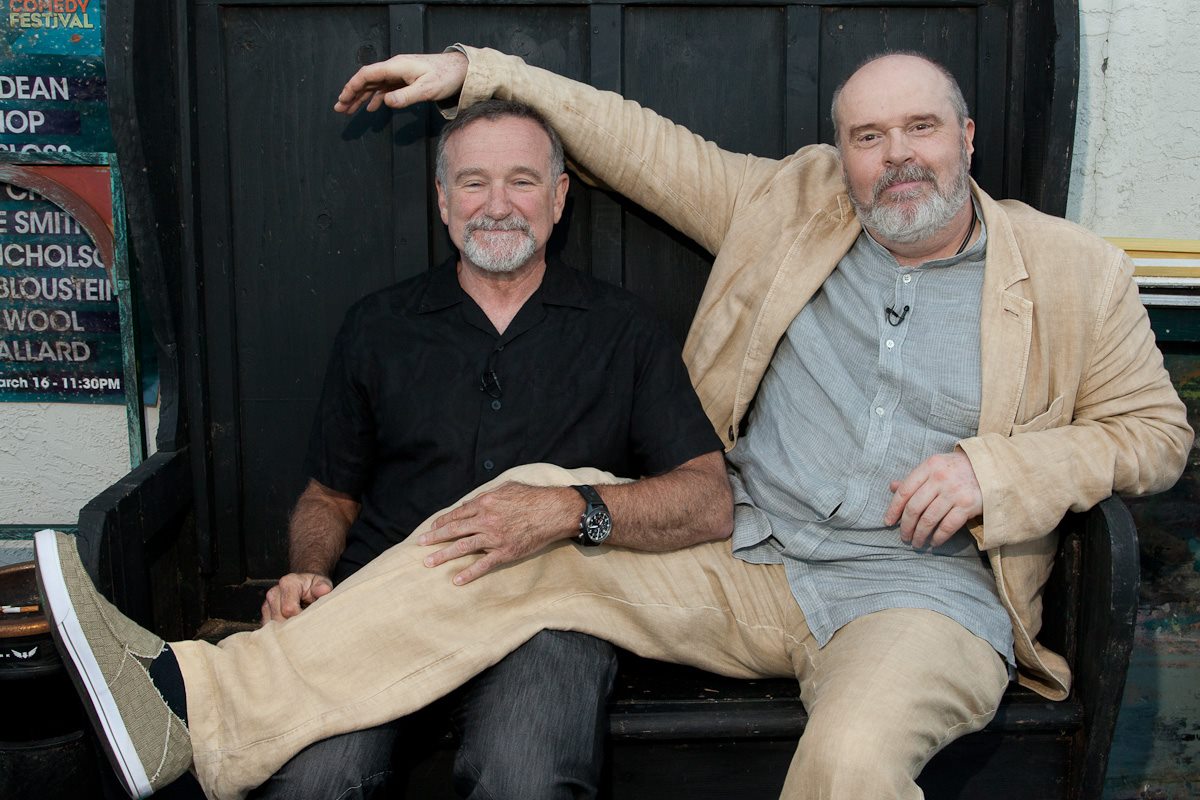
C: That's beautiful. It sounds like he was a great friend.
R.O.: He was a great friend.
C.: I know he was an inspiration to a lot of people. As close as you guys were to each other, I'm sure you shaped each other's lives a lot.
R.O.: Well, maybe to a certain degree. I don't know. I couldn't speak for him, but I know we both had a nice place in each other's hearts.
C.: I can see that.
R.O.: There was never a bad time. And you know he would he would never miss a chance to come out and play.
C.: What's your funniest memory of him?
R.O.: Oh, there's too many. Just, you know... one of my dreams was in my life I wanted to be, basically in the same position that, say, Harvey Korman would have been in while Walton Conway was obliterating him during a sketch in The Carol Burnett Show. And he just has to hold his face, but he's like squinting and tears are running down.
I have countless moments like that with him. In fact, I want heaven to look like that, cut into a loop and replayed.
C.: That would be great.
R.O.: That would be so good. But I lived it so I'm a little bit spoiled now 'cause I've had a lot of it, I have had a taste.
C.: And you get to carry it with you and share it. That's great.
R.O.: Yeah. That's the idea
C.: Seeing you two on stage, with Robin being as wild as he was; were you ever nervous being on stage with him? Was he hard to keep up with?
R.O.: Of course. At first.
I mean, he was always generous, so that's not why you're nervous. You're nervous because everyone's looking at you standing next to him, like, "What's this punk kid going to do with the other guy there?" You know, like, "who's this other guy?"
Basically, it's not even running neck and neck with Robin; it's how well you sort of followed along somehow, you know, at the speed he was going.
C.: Yeah, it feels like it would be nerve wracking to me.
R.O.: I'm not gonna lie. It is a little nerve wracking to be keeping up with the fastest brain on stage. It's a little scary, dude. When you put it that way, I'm getting a little adrenaline right now thinking about it.
I guess in the moment you tell yourself, "here we are, let's go, let's do this" and you don't think about it until later. You just dive in and do it.
C.: I know he was a pretty avid cyclist...
R.O.: Oh my God, I call him the bullet.
(Laughter)
You can't keep up with the bullet!
You know he even bought me bicycles, and I was doing my best to keep up with him, you know? We'd go for a ride and I'd be like, "Okay, I'll see you there." There was just no way I'd be able to ride at the speed that the bullet would ride at.
With all the crap my knees have been through, you know, coming off my motorcycle all banged up, I just can't do it the way I used to. But nothing stopped him. Nothing could stop the bullet.
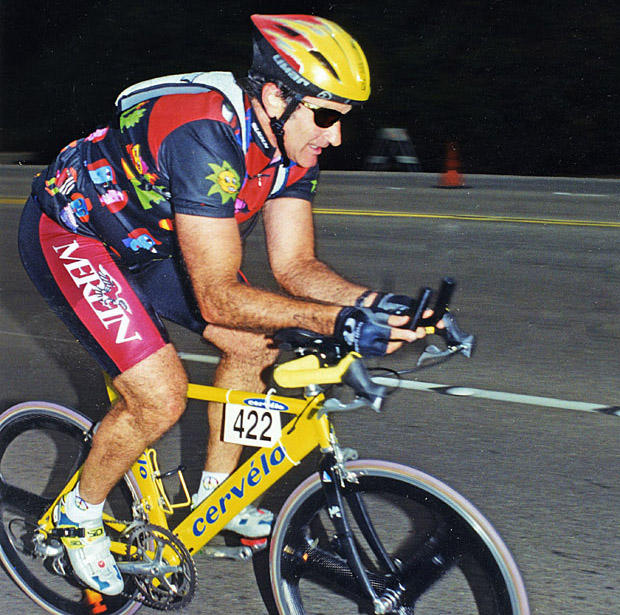
C.: What were some other interests he had outside of comedy and cycling? Or that you two shared?
R.O.: The love he had for his family and his kids, of course. He was always doting on them and talking about them. Nice stuff like that. Being a good dad you know.
And he liked collecting little Japanese anime figures and things like that.
C.: (Laughs) Oh, really?!
R.O.: He had a big wall of a collection of all kinds of interesting Japanime and other stuff like that.
C.: That is so cool.
R.O.: The kid in him stayed alive; he kept the kid alive, you know. And I think the kid kept him alive for as long as the body could make it.
But the movie is really gonna help a lot of people. Maybe they have a relative with (Lewy body dementia) and they don't know what this could lead to, and they don't understand what the other person is going through. And hopefully Robin's Wish is going to help clear some of that up. It's not possible to clear all of it up, it's just too individualized, but to have a little insight would be great. And this gives a lot of insight. There's a lot of insight in this movie.
C.: Yeah, it does. And I think it's gonna be something that's very helpful. What is it you're hoping people will take away from this film?
R.O.: Solace isn't always the right word...but when the brain understands something, rather than if you didn't understand it and you're just living in your confusion and your imagination about something? It's just better to know. Just give me the prognosis, doc.
C.: Exactly.
R.O.: However bad that hurts, it's not as messed up as not knowing. It's the worst; not knowing.
C.: Of course. I think some people are going to connect with it. Lewy body dementia is such an unknown thing right now. I think it's going to help people. They're going to see and say, "oh, that's how dad's acting," or, "That's how grandpa's been acting."
R.O.: Dementia can have all kinds of things, where people are like, "Why did they blow me off?" or, "Why were they mean?" but it's not them anymore. By the time Robin claimed his life, it wasn't like the Robin we knew. It took that part. It's a thief. It's a bandit, and it steals personalites.
C.: Yeah, it is. I think it's about the worst disease there is.
R.O.: It's one of the worst things there could be. You're right about that. It's a heartbreaker. Look how many people felt the dagger of it, who were not close friends of Robin but still felt like they lost family. So many people.
C.: I'm tearing up thinking about it now. See what you did?
R.O.: Me too. See what I did? And I keep doing it. It keeps getting me too. We both loved him, I just had a little more on-site experience. I don't discount what you felt for him. It doesn't always have to be about proximity.
C.: What was his best quality?
R.O.: His generosity. How generous he was.
C.: Some people you can just tell, even if you don't know them personally, that they're a good person and I feel like he was one of them.
R.O.: Yeah. Yeah. I mean, there's different categories of great qualities of course. His imagination was one. His facility. His speed was another one. His sense of humor; they were all superpowers.
C.: It's amazing how all that came together so strong in one person,
R.O.: Yeah. One guy who decided to make people happy.
C.: We'll, now that I've got us both sad...
R.O.: Yeah!
C.: What are you working on?
R.O.: Ah, I've got a comedy special with Comedy Dynamics that'll be coming out and it's an improvised hour, in the vein of Jonathan Winters and Robin.
I'm going to do it without a script, and with a big ol' setlist where they project topics that you are supposed to talk about. But you have to invent new material for it, in front of a crowd from this setlist. It's called Overton's Setlist Special, and it's all improvised,
C.: Where will we be able to see that?
R.O.: ComedyDynamics.com. They are really becoming a thing.
C.: That's cool! I'll definitely check it out.
R.O.: Great! That's really a great place to take your comedy. You bet. Thanks!
C.: I appreciate you being so generous with your time and talking about things that I know are probably not easy to talk about. But I feel like it's going to help people. I really appreciate it.
R.O.:
And I'll say the same back to you too, because you're helping by doing this, so thank you. And it was a pleasure to talk with you.
C:
Thanks. It was a pleasure. Have a good day!
R.O.:
Catch you on the next one.
There you go. Rick was a very warm, intelligent, and obviously caring person to talk to. You can see why Robin and him got along so well.
I can't recommend the film enough. If you have a family member who has struggled with dementia, I think you're going to find a lot to identify with here.
Watch the trailer below:
Check out Robin's Wish, available On Demand and Digital today. And share what your thoughts in the Talkbacks.
For more info on Lewy body dementia and to find support you can visit: https://www.lbda.org/
Stay cool, and take care of yourselves and each other,
Cobrak
